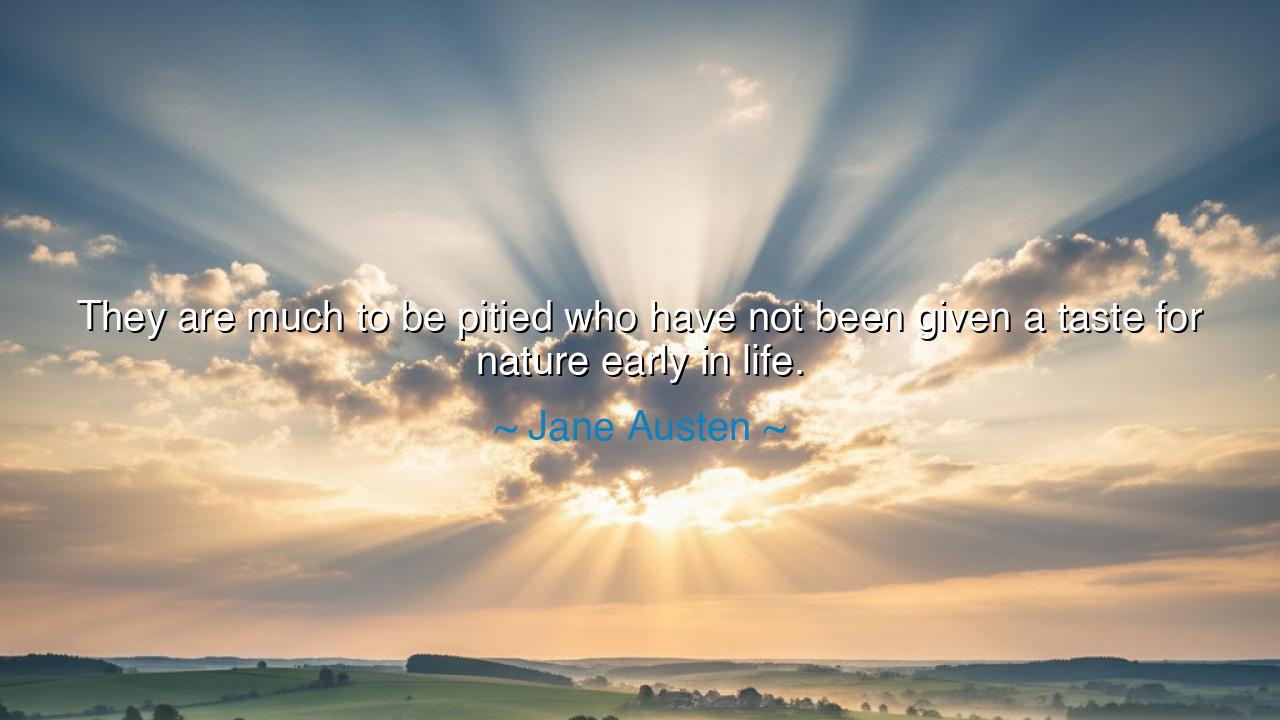
They are much to be pitied who have not been given a taste for






Hear, O children of time, the wisdom of Jane Austen, who, though best known for her tales of manners and love, spoke with rare clarity about the soul’s bond with the earth. She declared: “They are much to be pitied who have not been given a taste for nature early in life.” In this utterance, she mourns not the lack of riches or titles, but the absence of that deeper inheritance—the capacity to find joy, solace, and wonder in nature. For those who never learn to love the fields, the trees, the sky, are indeed impoverished, no matter their wealth.
For what is nature but the eternal teacher, the healer of sorrows, the fountain of beauty? A child who grows amid flowers, who runs barefoot upon the grass, who listens to the birds at dawn, carries within them a store of strength that no fortune can buy. Such a one, when trials come, can turn to the woods for peace, to the rivers for guidance, to the stars for perspective. But the one who has never tasted this communion is left adrift, seeking comfort only in fleeting pleasures of the world. Thus Austen pitied such souls, for they are cut off from the wellspring of life itself.
History confirms her truth. Think of Henry David Thoreau, who retreated to Walden Pond, living simply in communion with the earth. His writings were not born of luxury or indulgence, but of a heart that had tasted nature early and returned to it for wisdom. His solitude by the waters gave him clarity, and through him, generations learned that to walk in the forest is to walk into oneself. Contrast this with those trapped in cities of stone, who see only walls and smoke and lose touch with the ground beneath their feet. Their restlessness, their despair, often arises from this exile from the natural world.
Nor is this lesson confined to philosophers. Consider Winston Churchill, who in his later years painted gardens and landscapes with fierce devotion. In times of turmoil and despair, he turned to nature’s colors to steady his mind and calm his spirit. It was not politics, nor wealth, nor power that restored him—it was the green of fields, the blue of skies, the stillness of a pond. Even the mightiest of men, when wounded by life, must drink from nature’s cup to be healed.
The teaching is thus: expose the young to nature early, that their souls may be fortified. Let them climb trees, chase streams, watch clouds drift across the heavens. These experiences will not fade but will dwell within them as quiet treasures, ready to sustain them in hours of sorrow. Those who are denied this taste may forever seek in vain what their hearts do not know how to savor.
Practical action lies before us. Take your children, your students, your loved ones into the open air. Do not let their days be filled only with glass screens and walls of stone. Show them the miracle of a seed becoming a flower, the majesty of a mountain, the silence of the night sky. If you are grown and were not given this gift, it is not too late—step outside, learn again to look, to listen, to touch the earth as if for the first time. Nature welcomes all, whether child or elder.
So remember, O seekers: those who lack a taste for nature are indeed to be pitied, for they miss one of life’s purest joys. But pity alone is not enough. Give to yourself and to others this inheritance. Walk the fields, breathe the wind, cherish the dawn. For in nature is wisdom, healing, and delight—and to drink from her cup is to be truly alive.






AAdministratorAdministrator
Welcome, honored guests. Please leave a comment, we will respond soon